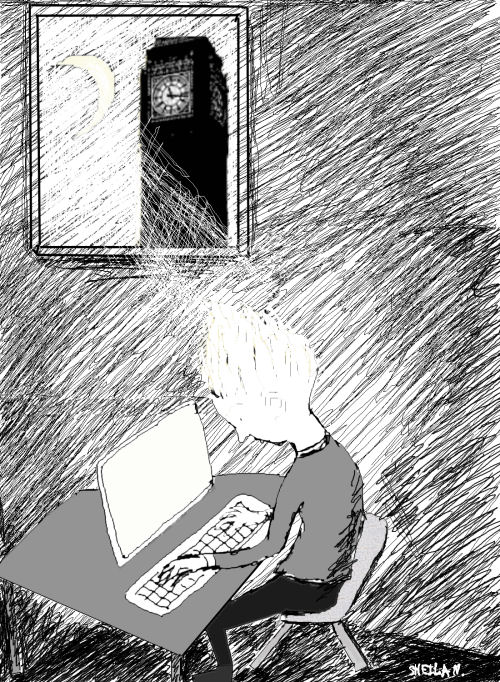Julian Assange, courageous publisher: Ecuador's gain is Australia's loss

Julian Assange, the courageous innovative publisher of Wikileaks, who told the world the truth about US army torture of Iraqi prisoners at Abu Ghraib has been found by the united Nations to have been illegally held in indefinite detention since he was granted asylum by Ecuador in August 2012, due to the British and Swedish governments complicity with the United States. Now Australia has lost this citizen of global courage and action in defence of human rights, to Ecuador, which has just recently granted him citizenship. See "Julian Assange granted Ecuadorian citizenship to provide 'another layer of protection'".

The whole Assange case could have been resolved years ago, had the Swedish government given Assange a guarantee that he would not be extradited to the United States, should he go to Sweden to face charges (now dropped) of rape. The fact that no such undertaking was made by the Swedish government (supposedly neutral, but in reality an ally of the United States) clearly demonstrates that the charges of rape were no more than a ploy to arrest Assange and deliver him to the United States deep state.
Throughout this long detention and shameful denial of Julian Assange's human rights, Australian parliament has received letters and petitions asking for the government to help Julian Assange, as an Australian citizen and Victorian resident. To our knowledge, only Greens MPs, notably Scott Ludlum, and, at least once, Adam Bandt, have spoken up on the subject, especially in relation to Bills restricting Australian freedoms and expanding state surveillance. Prime Ministers Rudd and Gillard have been passive in their responses to questions about Assange's welfare, with Gillard actually making the public error of saying that Wikileaks was illegal. Basically no Australian government has stood up for Assange, even though they have occasionally protested that he has received the same rights as any Australian citizen. This has been denied by Assange and his mother. See, "Fed Govt defends its consular assistance to Assange," at http://www.abc.net.au/pm/content/2012/s3515562.htm. [See note for why we haven't actively linked to this ABC site.[1]] Most tellingly, the fact that the Australian government never denounced Assange as a criminal shows that they must have known he was not guilty of the charges against him. See our excerpts below from Hansard.
Hansard Documentation of how Australia handled Assange's detention and threats to his safety
...............................................................................................................................................................
Julie Bishop, Monday, 19 June 2017, responding to letter: Page: 6766,
"Dear Mr Vasta
Thank you for your letter of 20 March 2017 regarding the petition (PN0054) submitted by the Concerned Citizens of Australia to the Standing Committee on Petitions.
The petition refers to Opinion No.54/2015 of the UN Working Group on
Arbitrary Detention adopted on 4 December 2015, in which it considered that Mr Julian Assange was arbitrarily detained by the Governments of Sweden and the United Kingdom of Great Britain and Northern Ireland. In that opinion, the Working Group expressed the view that Mr Assange is 'entitled to his freedom of movement and to compensation'. The petition requests that the House of Representatives do all within its power to end Julian Assange's detention.
I received legal advice on the implications of the findings of the Working Group in February 2016. It is important for the Standing Committee on Petitions to appreciate that the Working Group's opinion is directed at the United Kingdom and Sweden; not Australia. Australia cannot intervene in the legal processes of another country, just as we would not countenance other states intervening in Australian legal processes. I also note that the opinions of the Working Group are not legally binding on states.
Mr Assange has been afforded due process by authorities in the United Kingdom, and has avoided lawful arrest by choosing to remain in the Ecuadorian Embassy. Mr Assange will need to address his situation through legal processes in the United Kingdom and Sweden, with the assistance of his legal advisers.
However, the Australian Government stands ready to provide Mr Assange with the same consular assistance it would give to any other Australian in these circumstances should he request it, in accordance with the Consular Services Charter. I enclose a copy for the Standing Committee's consideration.
I trust this information is of assistance.
Yours sincerely
from the Minister for Foreign Affairs, Ms Bishop." Monday, 19 June 2017
Page: 6766, House of Representatives, Parliament of Australia.
Senator Ludlam, West Australia, 4 July 2011
"Under existing law, the collection of foreign intelligence is confined to the collection of intelligence concerning the activities of foreign governments, organisations they control or foreign political organisations for the purpose of the defence of Australia or the conduct of international affairs. That is how ASIO have been doing the work that they have been doing in tracking al-Qaeda and tracking terrorist organisations that are much closer to home operating in our neighbourhood. They have these powers. They use them extensively. It is the sole justification that has been given to us for why their staffing and their budget quadrupled in the last decade. It is precisely because they have the range of powers that they need to track non-state actors who mean Australians harm or mean to pursue violent political activities in other countries. They have the powers that they need. When we asked what exactly this was all about, nobody was able to tell us.
What it does do is that it permits ASIO much wider scope to investigate the activities of Australians who are overseas and who do not necessarily pose a threat but perhaps do have implications for foreign relations, such as Julian Assange and other people working in the WikiLeaks organisation. WikiLeaks and Mr Assange obviously have implications for Australia's foreign relations. Things falling out of the document drop were on the front page of every newspaper in the country day after day after day six months ago, and even now those shock waves continue to reverberate through the diplomatic community. So there is no way that you can say that there are no implications there for Australia's foreign relations. But should that entity be spied on by ASIO? Should our clandestine Cold War era spy agency be tracking down Mr Assange, maybe his family if they travel abroad, people working for that organisation, journalists, or people he is talking to or that that organisation is involved with? It appears that the reason that this bill has been known as the 'WikiLeaks amendment' in the Attorney's department is that that is precisely what is intended. The committee simply did not address that issue, and neither did the officer at the table when we asked during the inquiry. This is one example of how a person or organisation outside Australia, combined with the notion of Australia's foreign relations, very considerably expands the scope of ASIO's activities. Australians working overseas for firms that are major rivals to key Australian industries would also be covered. They would be caught by the economic wellbeing argument. If the government has a counterargument to this, it would be delightful to hear it." Senator Ludlam, West Australia, 4 July 2011, BILLS - Intelligence Services Legislation Amendment Bill 2011 - Second Reading,
Senator Ludlam, Petitions Wikileaks, 9 February 2011
"To the Honourable President and Members of the Senate in Parliament assembled:
The Petition of the undersigned shows:
1. That Mr Julian Assange is an Australian Citizen.
2. That on 2nd December 2010 the Prime Minister stated that the publishing of certain information on the Wikileaks website by Mr Assange was “An Illegal thing to do”.
3. That the Attorney-General of Australia has stated that he has considered the cancellation of the Australian Passport held by Mr Assange.
4. United States Politician, Ms Sarah Palin, has called for Mr Assange to be “hunted down”.
5. Mr Tom Flanagan, Senior Advisor to the Canadian Prime Minister has, on public television, called for Mr Assange’s assassination.
Your petitioner requests that the Senate:
1. Call upon the Prime Minister to explain to the Senate the basis for her allegation against a fellow Australian citizen that he is a criminal.
2. Call upon the Attorney-General to state to the Senate whether he received any request for the cancellation of Mr Assange’s Australian Passport pursuant to the Australian Passports Act.
3. Call upon the Minister for Foreign Affairs to summon the Ambassador for from the United States of America to Australia and demarche condemning the comments of Ms Patin. [sic - meant Palin.]
4. Call upon the Minister for Foreign Affairs to summon the Canadian High Commissioner to Australia and demarche condemning the comments of Mr Flanagan.
5. Call upon the Governor-General of Australia to provide such protection and assistance to Mr Assange as to which he may stand in need. "
Senator Ludlam, Petitions Wikileaks, 9 February 2011,
Senator Ludlam, West Australia, 3 March, 2014
"I wonder whether the Attorney-General might rise to the occasion, as it were, and provide us with some information as to why he will not back up on the public record, neither here in this chamber nor even at an estimates committee last week, how he is able to accuse Mr Edward Snowden the whistleblower of being a traitor when he has been neither charged nor convicted of any crime in the United States, when senior US administration figures have been careful not to use that phrase and when he cannot prove or show any evidence whatsoever that Australians have been put in harm's way? Similar claims were put about publisher Julian Assange when the WikiLeaks documents were first put into the public domain. And unless Senator Brandis is about to prove me wrong, we are about to see debate in here closed down." Senator Ludlam, West Australia, 3 March, 2014, National Security - Order for the Production of Documents,
Senator Ludlam, W.A. Australian Greens, 7 February, 2017
"We let Australian citizen Julian Assange and his courageous colleagues hang out to dry for disclosing war crimes in Iraq and more conventional crimes revealed in the state department cables. When the United States government says jump, then, if we are lucky, our Intelligence and Security Committee will do a rapid bipartisan inquiry into how high. But inevitably, we jump." Senator Ludlam, W.A. Australian Greens, 7 February, 2017, "ADJOURNMENT - Australia-United States Relationship,"
Michael Danby, MP, Melbourne Ports, 1 December 2014, Counter-Terrorism Legislation Amendment Bill, (No.1) 2014
"I want to end with this discordant note. It is not surprising to see the Greens political party lead the charge against this proposed legislation. In my view, the Greens seem to have an automatic Pavlovian kind of reaction to undermining the intelligence capabilities of our country. People like the Greens political party's Senator Ludlam have publicly supported self-appointed protectors of privacy and trust—stalwarts of moral standing like Julian Assange. Of course, the Greens' backing of Julian Assange and his ideological stablemate Edward Snowden has not exposed a single piece of evidence of the abuse of privacy or citizens' rights in authoritarian countries like Russia. Mr. Assange, the Greens' hero, used to host a program on the Russian disinformation network RT. To give you a flavour for his content and his policies, his first interview gave an armchair ride to Hezbollah's feared terrorist leader, Sheikh Hussein Nasrallah.
Indeed, it is delicious irony that the Greens' other hero, Edward Snowden, preaches excessive oversight and accountability but chooses to reside in Russia, of all places. He destroyed his credibility when popping up on Russian TV a few months ago to give another soft-serve Dorothy Dixer to the new Russian tsar, Vladimir Putin. Perhaps the Greens believe Russia is actually a bastion of human rights. Certainly, Senator Rhiannon used to believe that. I am honoured with the fact that Senator Ludlum has put a fatwa on the Greens speaking to me because I pointed out Senator Rhiannon's political similarity to the wife of the Romanian dictator, Elena Ceausescu. But the main point I make about her is she has never dissociated herself from her membership and participation in the pro-Soviet Communist political party in Australia. It was a seamless transition to the Greens.
Of course, the serious people in this parliament can smirk about Snowden's choice of patrons and about Assange's presence on RT. But it is hard to believe that here, in this House, we have parliamentarians that oppose legislation and seek to foil the efforts of our Defence forces and cooperation with our security services overseas. It occurs to me that the Greens political party ought to be more concerned about people losing their heads than about the people holding the swords. We had the appeasers in the 1930s. Eighty years later we have the Greens." Michael Danby, MP, Melbourne Ports, 1 December 2014, Counter-Terrorism Legislation Amendment Bill, (No.1) 2014,
See also, Greg Barns, "Now is the time for Australia to finally stick up for Julian Assange," The Drum, 12 May, 2015. :
Prime Minister Gillard responds to question from Adam Bandt, MP, Greens in House of Representatives, Australian Parliament, Questions without Notice, 13 May 2015:
"Mr BANDT (Melbourne) (14:34): My question is to the Prime Minister. Senior figures in the United States have called for Julian Assange to be hunted down and in the US courts he may face the death penalty. Has the government sought an assurance from the United States that he will not be prosecuted. What steps has the government taken, or will the government take, to prevent Julian Assange being taken to the United States? Will the government put the interests of Washington ahead of the liberty of an Australian citizen and the freedom of the press?"
"Ms GILLARD (Lalor—Prime Minister) (14:35): I thank the member for Melbourne for his question. I know that he is raising an issue that is on the minds of many Australians as result of the recent news about the decision in the UK on the extradition matter involving Mr Assange. Can I assure the House of the following: the Australian government is providing full consular assistance to Mr Assange, as it does for all Australian citizens. I am advised that Australian consular officials visited Mr Assange on a number of occasions during his period of detention in London and raised several matters of concern with prison authorities on his behalf. Australian consular officials have attended all of Mr Assange's court appearances, including yesterday's hearing.
Since Mr Assange was released on bail, Australian officials have repeatedly conveyed offers of consular assistance through his lawyers, with whom they were most recently in contact yesterday. Swedish authorities have confirmed that any legal action against Mr Assange will be conducted in accordance with due process. As the Minister for Foreign Affairs has said today, at this stage we do not have any advice from the United States that there is an indictment against Mr Assange or that the United States has decided to seek his extradition. If at any stage in the future Mr Assange faces legal proceedings from the United States we would, for Mr Assange—as we would for any other Australian citizen—seek assurances from the United States in relation to due process. The Australian government cannot interfere in the judicial processes of other countries, but of course we will continue to closely monitor proceedings against Mr Assange and continue to provide full consular assistance to him." 13 May, 2015,
See also: "Prime Minister Julia Gillard has been left floundering after she labelled the actions of the WikiLeaks 'illegal', but couldn't say how" (24 February 2015) | SBS
Mr Rudd responding to a letter re Assange, 4 July 2011
Dear Mr Murphy,
I refer to your letter of 16 March 2011. regarding a petition about Mr Julian Assange, submitted for the consideration of the Standing Committee on Petitions. I note the Committee's referral under Standing Order 209(b) of items 3 and 4 of the petition. My response follows.
Item 3 called upon me to summon the Ambassador for the United States of America to Australia and demarche him condemning the comments of American politician Ms Sarah Palin on Mr Assange. Item 4 called upon me to summon the Canadian High Commissioner to Australia and demarche him condemning the comments of Mr Tom Flanagan, former Senior Advisor to the Canadian Prime Minister, on Mr Assange.
The Australian Government deplores and condemns all calls to violence against any Australian citizen wherever and by whomever they are made. However, neither of the individuals in the petition cited are holders of public office in their respective countries so it would not be appropriate to demarche their governments through their diplomatic representatives on statements they are reported to have made. Both the United States of America and Canada have laws protecting the rights of individuals against threats to their person. under which any concerns about these reported statements could be pursued.
NOTES
[1] The reason we have not linked to the Assange article on the ABC is because the ABC does not have an SSL certificate for this article. That means that if we link to it, oversensitive browsers will say that candobetter.net is linking to unsafe links. SSL certificates are security certificates. Just because the ABC does not have an SSL certificate, it does not mean the site isn't safe; it just means that it hasn't paid its protection money to issuers of SSL certificates. But your browser may tell you that it is unsafe - so we don't actively link.


 May 5th 2010 - St Kilda and South Melbourne ALP Branches present POPULATE AND/OR PERISH: Are our migration numbers right or wrong?
May 5th 2010 - St Kilda and South Melbourne ALP Branches present POPULATE AND/OR PERISH: Are our migration numbers right or wrong?
Recent comments